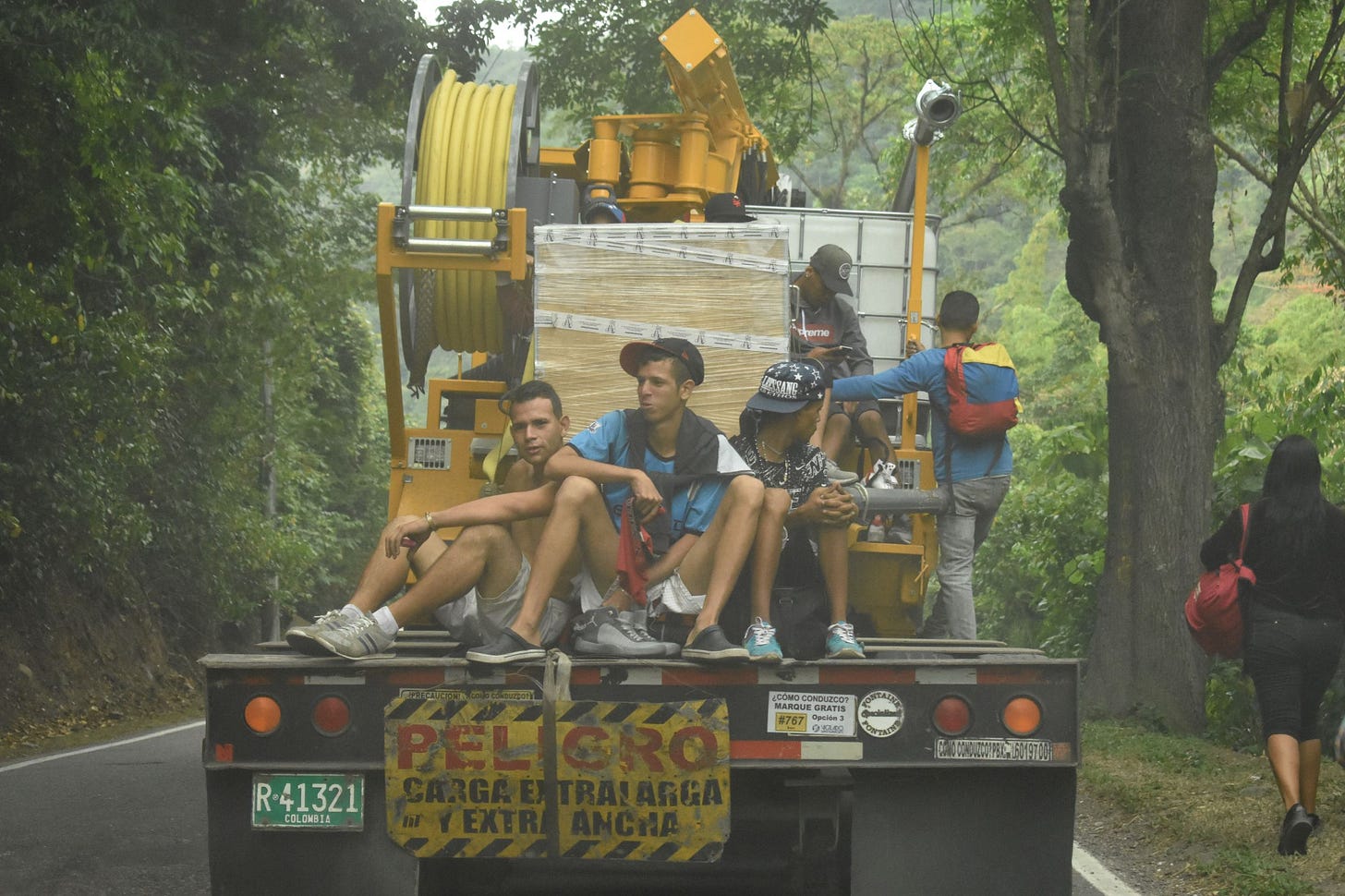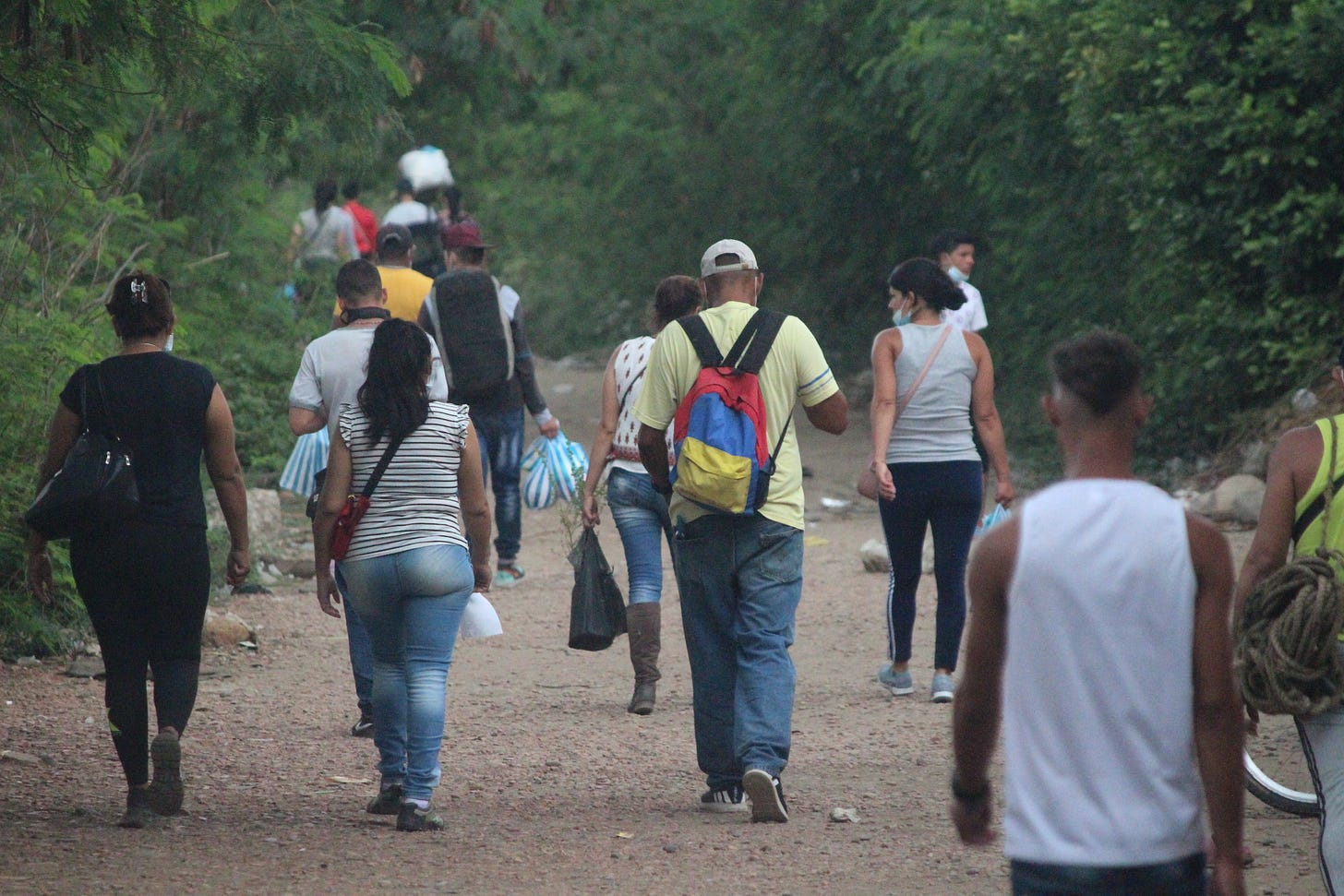Why you don’t want to be a Venezuelan migrant right now
Regional policy changes and conflicts are making migration more difficult - and more dangerous

This week, paying subscribers to Pirate Wire Services received The Ship’s Log, a new series of reflections and essays on the challenges of writing about Latin America. Our work is possible thanks to your support, so if you like what you’re reading, do consider taking a paid sub!
Bogotá, Colombia- For more than six years, Venezuelans have been leaving their country in record numbers. The diaspora now numbers over 6 million people, representing roughly 20% of the population. Fleeing a profound political, economic and humanitarian crisis, they have spread to every corner of the Americas, some trekking across a continent on foot in search of a better life.
“The arepa is conquering the world,” my roommate Javier Jose Garcia, a Venezuelan artist in Bogotá, likes to joke, referring to the delicious traditional cornbreads that have become a familiar street food all over the region. But his jokes, while showing a sense of pride in the culture he left behind, also mask a darker truth.
Many countries that once welcomed Venezuelan migrants are now making it clear through both policy and actions that venecos - a sometimes-derogatory Spanish term for Venezuelans who have left their country - are no longer welcome.
In January, under pressure from the US, Mexico announced visa restrictions on Venezuelans for the first time ever. Officially, the government cited a 1000% increase in irregular Venezuelan entries to the country over the last five years, as well as attempts to fight human smuggling.
The US, which has not had diplomatic relations with Venezuela since 2019, in January began detaining Venezuelans who had entered the country illegally and deporting them to Colombia. In theory, any Venezuelan who crossed through Colombia as part of their migration is subject to the new policy, regardless of whether they held residency there or not. It is unclear how the new rules will apply to those who crossed Colombia but were never officially registered there, and under what circumstances Venezuelans captured by migration officials at the US border will face deportation.
Arrivals at the US border have risen sharply in recent months. In December 2021, 24,819 Venezuelan migrants were detained by US Border Patrol compared to 205 in December 2020.
“It’s clear the United States is pressuring AMLO [Mexican President López Obrador] to curb the record numbers of migrants arriving to the US”, said Adam Isacson, security and border director for the Washington Office on Latin America (WOLA), a think tank that studies human rights in Latin America, “and AMLO has bowed to that pressure.”
The death of a seven-year-old girl who drowned trying to cross the Rio Grande into Texas last month made international headlines. The Biden administration recently signed legislation that grants Temporary Protected Status to Venezuelans seeking asylum, but it almost exclusively covers people who are already in the US.
Meanwhile, the administration has re-started controversial Trump-era programs Title 42, which allows for the immediate expulsion of migrants entering the country informally, and “Remain in Mexico”, a policy which forces would-be asylum seekers to wait months in often dangerous third countries, usually Mexico, while their cases wind through the courts.
The result has been sprawling tent cities in Mexico near the US border, where migrants who have no other options wait in perilous conditions. The UN has called the policy “a violation of the human rights of migrants, many of whom have legitimate asylum claims.”
At the Darien Gap, the infamous jungle crossing on the Panamanian-Colombian border, Venezuelans making the crossing outnumbered Haitians for the first time in January.
“It isn’t clear from the data yet how much of that traffic is due to new visa restrictions in Mexico,” said Isacson. “But in the past, most Venezuelans attempting to enter the US flew into Guadalajara and continued north by land.”
Being forced to make the entire journey by land exposes migrants to serious danger, not only in the Darien Gap and southern Mexico, both notoriously dangerous regions where migrants are routinely preyed upon, but also closer to home.
Regional conflicts in the Colombian-Venezuelan borderlands exploded in January. As armed groups battle, migrants traversing the region have been subjected to forced recruitment, sexual assault, robberies and even killings.
Some Venezuelans, deterred by the dangers of crossing a continent by land, opt for sea crossings to the neighboring island nation of Trinidad and Tobago, but they fare little better. More than a dozen shipwrecks of migrant boats attempting to reach the island have left scores dead. Migrants have been preyed upon by smugglers, sex traffickers and even pirates. Trinidad and Tobago, which hosts the largest per-capita population of Venezuelans in the world, has faced criticism for instant deportations which have put migrants at serious risk.
In April 2021, a boat that had been turned away by the Trinidadian Coast Guard carrying 24 Venezuelans capsized, leaving at least 17 people dead or presumed dead. On February 6, a Coast Guard vessel fired on a migrant boat, killing an infant and seriously injuring the mother.
As the Venezuelan exodus continues, xenophobia towards migrants is growing. Ecuador, Chile and Peru have all seen anti-Venezuelan protests in recent months, and Colombian politicians like mayor of Bogota Clauda López have made increasingly xenophobic public comments, falsely claiming that migrants are responsible for recent upticks in crime .

Stricter border policies across the region, imposed in response to growing anti-immigrant sentiment, haven’t stopped the migration. It has merely forced migrants into the hands of criminal groups and smugglers, where they are far more vulnerable to being preyed upon.
“This migration corridor is one of the most dangerous in the world,” William Spindler, Latin America spokesperson for the United Nations Refugee Agency (UNHCR) told PWS by phone from Panama. “What we are seeing is the result of policy which effectively bars all legal entry to economic migrants, who are not classified as refugees [by the UN].”
“These numbers are only likely to grow in 2022, and all destination countries must plan to deal with the humanitarian needs of this population rather than criminalize them.”
Stories we’re watching:
A trial against Bolivia’s former interim president Jeanine Áñez started on Thursday, but was soon postponed following a series of technical and procedural issues. Áñez stands accused of participating in a coup against Evo Morales, who was forced to resign in November 2019.
In the Patagonian province of Río Negro, Argentina, indigenous rights groups and environmental campaigners say they have been threated and illegally detained by an armed mob answering to British business magnate Joe Lewis as they marched to demand access to Lake Escondido. By Argentine law, the lake is public property.
Spanish words of the week:
Mamar gallo - This phrase, popular in Colombia and Venezuela, means messing around or wandering about aimlessly and should not be taken literally. It is also a masterclass in why you should never, ever use automatic translation on a live website, as this Baranquilla news outlet found out:




